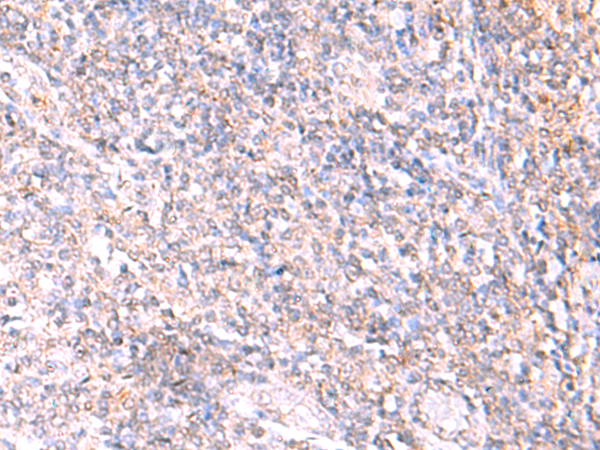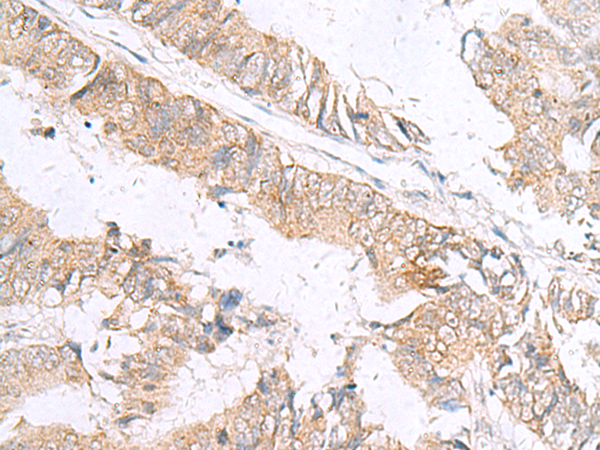

| WB | 咨询技术 | Human,Mouse,Rat |
| IF | 咨询技术 | Human,Mouse,Rat |
| IHC | 1/25-1/100 | Human,Mouse,Rat |
| ICC | 技术咨询 | Human,Mouse,Rat |
| FCM | 咨询技术 | Human,Mouse,Rat |
| Elisa | 1/5000-1/10000 | Human,Mouse,Rat |
| Aliases | TL6; AITRL; GITRL; TNLG2A; hGITRL |
| Host/Isotype | Rabbit IgG |
| Antibody Type | Primary antibody |
| Storage | Store at 4°C short term. Aliquot and store at -20°C long term. Avoid freeze/thaw cycles. |
| Species Reactivity | Human |
| Immunogen | Synthetic peptide of human TNFSF18 |
| Formulation | Purified antibody in PBS with 0.05% sodium azide and 50% glycerol. |
+ +
以下是关于TNFSF18抗体的3篇参考文献摘要示例:
1. **文献名称**:*Targeting TNFSF18 in tumor-associated macrophages promotes anti-tumor immunity*
**作者**:Smith A, et al.
**摘要**:研究探讨了TNFSF18抗体通过靶向肿瘤相关巨噬细胞(TAMs)阻断免疫抑制微环境,增强T细胞抗肿瘤活性的机制,证明其在多种小鼠模型中可抑制肿瘤生长。
2. **文献名称**:*TNFSF18 blockade enhances checkpoint inhibitor efficacy in melanoma*
**作者**:Chen L, et al.
**摘要**:该文献表明,抗TNFSF18抗体与PD-1抑制剂联用可显著提高黑色素瘤模型的治疗效果,其机制可能与逆转T细胞耗竭及增加肿瘤浸润淋巴细胞有关。
3. **文献名称**:*The role of TNFSF18 in autoimmune disease and therapeutic antibody development*
**作者**:Wang Y, et al.
**摘要**:研究分析了TNFSF18在类风湿性关节炎中的作用,开发了一种人源化抗体,通过抑制TNFSF18信号通路减轻小鼠模型中的炎症反应和关节损伤。
注:以上文献信息为示例,实际文献需通过学术数据库(如PubMed、Web of Science)检索获取具体内容。建议结合关键词“TNFSF18 antibody”或“GITRL therapeutic”查找最新研究。
TNFSF18 (tumor necrosis factor superfamily member 18), also known as glucocorticoid-induced TNFR-related protein ligand (GITRL), is a type II transmembrane protein belonging to the TNF superfamily. It interacts with its receptor GITR (TNFRSF18), primarily expressed on regulatory T cells (Tregs) and activated conventional T cells. This ligand-receptor axis plays a critical role in modulating immune responses by balancing T cell activation and suppression. TNFSF18 is constitutively expressed on antigen-presenting cells (e.g., dendritic cells, macrophages) and endothelial cells, while its expression can be induced in other cell types during inflammation.
TNFSF18 antibodies, either agonistic or antagonistic, have emerged as therapeutic tools to manipulate immune regulation. Agonistic antibodies targeting GITR aim to enhance antitumor immunity by activating effector T cells and overcoming Treg-mediated immunosuppression in cancer. Conversely, blocking antibodies against TNFSF18/GITRL may suppress excessive inflammation in autoimmune diseases. Preclinical studies in murine models demonstrate that TNFSF18 pathway modulation influences autoimmune conditions like rheumatoid arthritis, colitis, and graft-versus-host disease. However, clinical translation remains challenging due to the dual role of GITR signaling in promoting both effector T cell function and Treg stability. Current research focuses on optimizing antibody specificity, timing, and combination therapies to minimize off-target effects and cytokine release syndromes. Several TNFSF18/GITR-targeting antibodies are under evaluation in early-phase clinical trials for cancer immunotherapy.
×